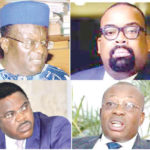Society recognises the fact that every person has or should have a name. The essence of a person having a name is to distinguish him from another person. It is therefore unusual for two persons to bear exactly the same name. Names are usually given at birth and registered with the civic authorities. Such name once given or registered is expected to be used throughout a person’s lifetime. The Supreme Court of Nigeria had cause to condemn the chameleonic attitude of a person changing his name each time the winds blow a different direction and referred to it as fraudulent.
In the case of Esenowo v. Ukpong (1999) 6 NWLR (Pt. 608) pg. 611 @617 the SC held that
‘There is a world of difference between ‘J.E. Esenowo and E.J. Esenowo’ for the purpose of registering a name in a professional register sanctioned by law. It allows crooks and quacks to infiltrate into the profession if at random a person can re-arrange his initials or order in which his names are written”
Therefore, a deliberate change of name or initials of a person is fraudulent and the law forbids it. A person’s name and initials must be constant and consistent as the rising and the setting of the sun. The Supreme Court reiterated this fact with more emphasis in the case of Titilayo Plastic Ind. Ltd v. Fagbola (2019) 118 Erudite Judgments of the Supreme Court @ 181, where the Supreme Court held that “the exact names used for professional purposes must be the same used in official capacity or else renders such document defective and not a mere misnomer.”
However, situations may arise which may make it compelling enough for a person to desire a change of name. The usual resort to deposing to “Declaration of change of name” is insufficient for this purpose. The Supreme Court affirmed this position in the very recent case of Peoples Democratic Party & 2 Ors. Vs. Biobarakuma Degi-Eremienyo & 3 Ors (2021) 9 NWLR (PT.1781) Pg. 27
The Supreme Court in its judgment delivered on the 13th day of February, 2020 held as follows
“The trial Court correctly stated the procedure for regularization and correction. Its statement at pages 575 and 576 “that affidavit of change, correction and confirmation of name has to be by Deed Poll and not mere deposition” is adverse to the 1st, 2nd and 3rd Respondents” (pg 15)
“The 1st Respondent did not explain why in 1990, inspite of the alleged error in 1984, Rivers State University of Science and Technology still inscribed the name “Degi Biobarakuma” on the certificate at page 62, and not Biobarakuma Wanagagha Degi, his name at birth or Biobarakuma Degi appearing on his 1990 Statutory Declaration of Age. It is clearly fraudulent for one person to allegedly bear several names that he uses variously, chameleonic to suit the changing environment.
“Clearly, the lower Court erred when it held that the affidavit of correction and confirmation of name sworn to by the 1st Respondent on 9th August, 2018 and the Chronicle newspaper advertorial placed by the 1st Respondent himself explained the discrepancies in all the information, Certificates and documents. For instance, neither the said affidavit nor the advertorial explained the name BIOBARAKUMA DEGI on the Statutory Declaration of Age… The law now is that, you cannot change or correct your name by swearing to an affidavit and publishing “change of name” in a newspaper. You can only change or correct your name by a Deed poll, and then proceed to the Nigerian Civil Registry to have it published in an official gazette”
The National Population Commission (NPC) has offices in every Local Government in Nigeria where births and deaths are being registered. It will be correct to state that the NPC offices are the successors of the Nigerian Civil Registry in modern Nigeria.






